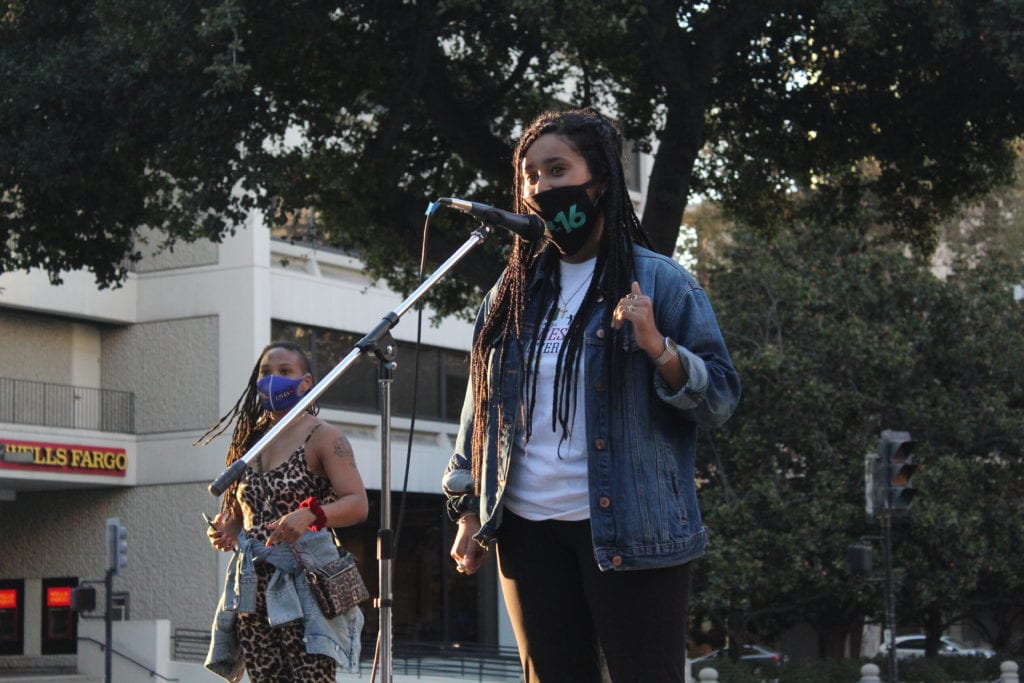Ever since Californians became the first state to outlaw affirmative action through a 1996 ballot measure, student action groups in San Jose have fought to get the issue back on the ballot.
“Some of these students are working, some have two or three jobs and they’ve been organizing and I want to make sure we’re commending them,” said LaToya Fernandez, founder of the community organization Youth Hype. “They’re going to be the ones benefiting from Prop. 16.”
More than 50 people representing local human rights coalitions gathered at Plaza de César Chávez Oct. 16 to rally support for Proposition 16, which would effectively overturn the 1996 affirmative action ban.
Restoring affirmative action in California would mean universities and government offices could factor in someone’s race, gender or ethnicity in making hiring and admissions decisions.
Prop. 16 opponents say the measure sanctions racial favoritism. They say allowing public schools and government to make hiring, spending and admissions decisions based on race or ethnicity is a form of prejudice.
San Jose’s demonstration was one of 11 in-person rallies promoted as part of a statewide student day of action for Black Lives Matter and Prop. 16.


Affirmative action was established through executive order by President Lyndon B. Johnson in 1965, and its benefits were extended to women soon after.
But debate around the civil rights-era legislation has grown more divisive as people argue the need for affirmative action.
Fifteen-year-old Reyna Duran, a member of the NAACP Youth Chapter in San Jose, said she can benefit from affirmative action as a Chicana preparing for college.
“Even if affirmative action doesn’t affect me, it still affects people I grew up around,” she said.
Duran learned about the benefits of affirmative action through virtual meetings with the NAACP Youth Chapter and said there is still a need for considerations based on race.
“We’ve seen their version of equality,” she said, referring to the 1996 ban on affirmative action. “I feel as it is not enough for people of color, women and the lower class.”
San Jose councilmembers recently unanimously endorsed Prop. 16, with District 2 Councilmember Sergio Jimenez saying that the state’s “color blind approach has failed us.”
Helen Kassa of the African American Community Service Agency said that to this day, students of color are underrepresented in the University of California school system.
“Affirmative action has been banned since 1996 and ever since we’ve seen a downward spiral on representation for Black and brown people and for women, and for our most vulnerable,” she said.
As Kassa spoke at the rally, a caravan of cars circled around Plaza de César Chávez with “Yes on Prop. 16” signs on the vehicles, blaring horns throughout the plaza.
“I think that might be the best speech interruption,” Kassa said.
While the focus of the rally was to highlight youth speakers, leaders from more well-known coalitions took to the mic to voice the wider implications of passing Prop. 16.
Zahra Billoo, executive director of the Council on American-Islamic Relations, San Francisco Bay Area Office, said the proposition would correct some wrongs of the past.
“When I heard that young people were organizing to support Prop. 16 today in an open and visible way that’s going to help educate and empower others, that was the draw (to come out),” she said.
Billoo said reinstating affirmative action in California is necessary because communities are still underrepresented in institutions of higher education and have less access to primary school education.
“The data would show that our work is not done,” she said. “Folks are underpaid in the workforce and when it comes to actual government contracts, I’d like to think we’re done. The data says otherwise.”
The two-hour rally came to a close when organizers distributed “Yes on 16” lawn signs and face masks to the few dozen people who remained, including San Jose Unified School District Board of Trustees candidate Tomara Hall.
Hall said she came out to speak because of the implications affirmative action has for people of color, especially the families she works with as a special education teacher
“Yes on Prop. 16, for affirmative action to promote diversity so that way people like my Mexican mom don’t always have to get 42 cents to the white man’s dollar,” she said. “And people like my dad are not always limited on their outlook on jobs.”
Contact Vicente Vera at [email protected] or follow him @vicentejvera on Twitter.



Leave a Reply
You must be logged in to post a comment.